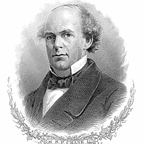
Salmon Portland Chase (1864-1873) held several political posts before serving as the country’s sixth Supreme Court Chief Justice. He was well-known for his anti-slavery stance and initiatives prior to being nominated to the Supreme Court by President Abraham Lincoln.
Early life
Salmon Chase was born in Cornish, New Hampshire on January 13, 1808. Chase was one of ten children and sometime after his father died in 1817, Chase went to live with his uncle, Bishop Philander Chase, a prominent member of the Protestant Episcopal Church.
He attended several schools in Vermont and Ohio before enrolling in Dartmouth College, from which he graduated in 1826. Chase taught at Royalton Academy while he matriculated at Dartmouth, and moved to Washington, D.C. following graduation to study law under U.S. Attorney General William Wirt. He was admitted to the bar in 1829.
Political life
Chase moved to Cincinnati, Ohio in 1830 to begin his law practice. He became well-known for being a passionate abolitionist and defending runaway slaves, earning him the local title of the “attorney general for fugitive slaves.”
Between 1841 and 1848, Chase was the leader of the abolitionist-oriented Liberty Party in Ohio, which would later become the Free Soil Party. The party was a contributing factor to his nomination to the U.S. Senate in 1849, where he worked to curb the expansion of slavery.
Chase was elected governor of Ohio in 1855 and served in this position until 1860. During his tenure, he strongly supported anti-slavery initiatives, women’s rights and public education.
Chase was elected to the U.S. Senate as a Republican in 1860, but resigned three days later to become President Abraham Lincoln’s Secretary of the Treasury. Between 1861 and 1864, Chase helped to implement a national banking system with the National Banking Act and designed new paper currency. In addition, Chase is known for placing the term “In God We Trust” on U.S. currency.
Chief Justice
Chase was nominated to the Supreme Court by President Lincoln, and served as Chief Justice from 1864 until his death in 1873. As Chief Justice, Chase presided over the impeachment trial of President Andrew Johnson in 1868. He also ruled in Texas v. White in 1869 that the Constitution allowed for a permanent union of indestructible states and imposed Reconstruction on the South. Many of the court cases that came under Chase’s authority revolved around the Reconstruction period.
Death
Chase passed away in 1873. The Chase National Bank, which preceded Chase Manhattan Bank, was named in his honor, along with several cities, counties and university departments across the United States.








